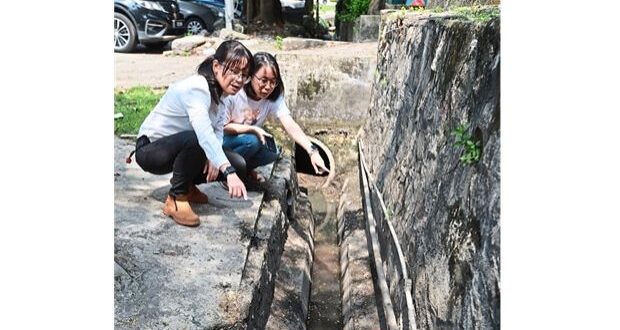TRADERS at Taman Universiti Indah morning market and its surrounding restaurant operators are urged to be more mindful when disposing waste in the Seri Kembangan commercial area in Selangor.
Subang Jaya City Council (MBSJ) Zone 21 councillor Suzanah Hanim Wong said this after a site visit following a one-day operation to clean clogged drains around the market.
She said it took two hours to remove all the gunk from the drain for water to flow.
“We have received complaints about clogged drains since August last year, but the problem has existed long before that.
Siew Ki (left) and Suzanah inspecting a drain around the Taman Universiti Indah morning market two weeks after the clean-up operation.
“The drains were clogged until surface level and the water was stagnant.
“I followed up on the matter twice with MBSJ’s Environmental Management Department (JPAS).
“On Feb 27, a JPAS and KDEB Waste Management (KDEBWM) crew were sent to clean the drains around the morning market,” said Suzanah.
The RM5,000 cost for the joint operation went towards paying for a cleaning crew of six workers, high pressure water jetter and roll-on, roll-off (RoRo) bins.
Suzanah said the waste removed from drains included food packaging, plastic bags, and oil.
Speaking during a press conference at the site, she said the operation was delayed because KDEBWM had limited equipment and there was a queue requesting for its services.
Seri Kembangan assemblyman Wong Siew Ki urged market traders and restaurant operators to step up and keep the environment clean.
“They need to clean grease traps daily, not throw rubbish into drains,” she said.
“Both Selangor and MBSJ spend a lot of money on cleaning and waste management,” she said.
“If citizens and business operators play their role, the money from cleaning and waste management can be used for development or welfare projects.”
Siew Ki said she planned to follow up on the issue of illegal dumpsites, such as at Taman Bukit Serdang in Section 5, Seri Kembangan.
“Selangor spends millions of ringgit to remove the waste and treat the soil to ensure it is safe,” she said, adding that illegal dumpsites were often found on private or reserve land.
 BeritaKini.biz Berita Viral Terkini di Malaysia
BeritaKini.biz Berita Viral Terkini di Malaysia





